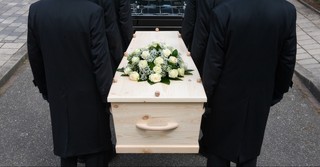- Recent Translations
- All Translations
Matthew 8:22
Share
Settings
Matthew 8:22 Meaning and Commentary
But Jesus said unto him, follow thou me
Christ would not excuse him on this account, but insists on what he had before called him to; to attend upon him, and give himself up to the ministry of the word: which was done, partly to shew, that a greater regard ought to be had to him, than to the nearest relation and friend whatever; and partly, on account of the dignity of the Gospel ministry, which greatly exceeds any such services; as also to signify, of what little account were the traditions of the elders with him; wherefore he says,
let the dead bury the dead.
Our Lord is not to be understood, as speaking against, or disrespectfully of burying the dead; his words suppose it ought to be done: only it was not proper, that this person should be concerned in it at this time, who was called to an higher employment; and therefore should leave this to be done by persons, whom it better became. And however strange and odd such a phrase may sound in the ears of some, of one dead man's burying another, it was easily understood by a Jew; with whom it is common to say, (tmk bwvx ajwxh) , "that a sinner is counted as F7 dead, and that ungodly persons, even while they are alive", (Mytm Nyywrq) , are "called dead" F8. And in this sense is the word used, in the former part of this phrase; and Christ's meaning is, let such who are dead in trespasses and sins, and to all that is spiritually good, bury those who are dead in a natural or corporal sense. It is likely the deceased was an unregenerate man; however, it is plainly suggested, that many of the relations were; and there were enough of them to take care of this service: and therefore, there was no need why he should neglect the ministry of the Gospel to attend that; but, ought to leave it to persons who were fitter for it.
F7 Tzeror Hammor, fol. 6. 2.
F8 T. Bab. Beracot, fol. 18. 2. Jarchi in Gen. 11. 32. Baal Hatturim, in Deut. xvii. 6. Tzeror Hammor, fol. 58. 3. Midrash Kohelet. fol. 78. 2. Caphtor, fol. 79. 1, 2. & 84. 1.

